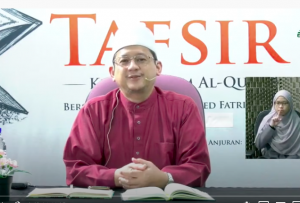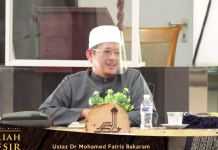This article is a summary of takeaways from Ustaz Dr Mohamed Fatris Bakaram’s Tafsir Online Lecture on 23rd August 2020. Summaries of previous lectures on Surah Maryam and Surah Taha and Surah Al-Ambiya’ can be found here. This lecture is a continuation of the previous lecture on Surah Al-Hajj.
Questions from the Previous Lecture
Blood that is not flowing
Q: If blood that is not flowing is not considered as Najasah and is therefore permissible for consumption, what is the ruling if that blood stains our clothes while we are cleaning or cooking the meat? Is it permissible to perform Salah in those clothes or should we wash the blood off first?
A: The ‘blood’ that we refer to is that which sticks to the meat, that which does not flow out during the slaughter. Someone who slaughters an animal and finds that some of the blood that flows out of the animal’s neck got onto his clothes, then for this person, it becomes compulsory to wash that blood off. That blood is Najasah.
We mentioned previously how the reddish fluid that sticks to meat has been declared by scholars as ‘not Najasah’, or alternatively, that it is Najasah, but Najasah that is excusable. So let us take an example of a woman who is preparing dinner. She chops up some raw beef as she is cooking, and in the process, some drops of the red fluid splashes onto her clothes. When prayer time comes, does it suffice for her to just wash her hands and take wudhu’? Or is she required to also change her clothes?
The answer is that she is not required to change out of her clothes. The “blood” is not Najasah, and even if it is, it is Najasah that is excusable.
Q: How about eggs that contain blood? Should we discard it first?
A: First, we need to ascertain whether the blood is on the inside or outside of the egg.
At times when we crack an egg, we see this tint of redness, like a drop of blood near the yolk. If this is what you consider blood within the egg, then this blood cannot be counted as ‘Damman Masfuhan’ or ‘flowing blood’. In that case, that blood is permissible. That blood is part of the yolk and if you were to incubate that egg, it will transform into the embryo.
If the blood is on the outside, it is on the eggshell. The question posed asked if it should be discarded. What does this mean; should it be washed or thrown away? If you are asking if it should be thrown away, then I assert that this is a wastage and not necessary. If the question is whether the egg should be washed, then there are some points to consider. We need to ascertain where the blood came from. Is it really blood?
If it is truly blood, for example we slaughtered a chicken nearby and the blood that flowed out from the neck squirted onto the eggs nearby, then it is indeed Najasah. However, Najasah on the outside of the egg does not make the inside of the egg itself Najasah. If we can ensure that in the process of us cracking the egg, that the egg’s contents do not come into contact with the blood on the eggshell, then it is ok for us not to wash it. We want to however take precautions and be careful. Make it a habit to wash the eggs after buying it. Ensure any impurities – be it faeces or blood stains – are removed from the egg so that the chances of contaminating the egg are removed.
These are the opinions of most scholars. I mention this because there is a small proportion of scholars who say that for eggs in any form – whether any physical impurities are present externally or not – washing is obligatory. This opinion exists because certain scholars say that when an egg is being laid by a chicken, it leaves from a wet orifice, and as such there will always be Najasah on the eggshell of any egg. This opinion is not widely held. In fact, amongst the Shafi’i scholars, there is an agreement that coming out of a wet orifice does not make the egg automatically Najasah.
So, the general opinion is that for as long as there is not visible physical impurity on the egg, then it does not have to be washed. If physical impurities are present and visible, then washing it is up to your discretion.
Q: Is it ok for me to get snippets of your tafsir lecture and share it with my friends and family?
A: I have no issue with this, I have heard of people who have done this previously. However, this can only be confirmed by the Mosque management. They are the ones who put in resources to make these lectures a reality. So, I would say that it is only proper Adab to ask the mosque members if it is ok for you to take a snippet or clip of the lecture to share with others. To me, there is no issue. But it does not take much to check anyway. Drop the mosque management an email or a Facebook message and see what they have to say. I do not think that this will become an issue unless you take these clips and you put a price to them and start selling them. This is clearly not allowed, as it would mean that you are making profit from something that has been produced by someone else.
Ease in the Religion
Q: You mentioned how in Islam, we are encouraged to make the religion easy for others. Don’t you think that the Islamic Religious Council of Singapore (MUIS) is making it difficult for people to pray in congregation in the mosques with the current online booking system?
A: I would like to thank whoever who has posed this comment, for giving me an opportunity to answer it from the perspective of Rukhsah or providing ease or facilitation. People have told me not to deal with such comments, saying that there is no point in entertaining such negativity. I am addressing this not because I want to entertain people, but because this does have relevance to the topic which we have previously covered, on making ease and not making things difficult.
So, we have discussed that the religion of Allah SWT is not one that makes life difficult for people. I mentioned the hadith saying:
إِنَّ الدِّينَ يُسْرٌ، وَلَنْ يُشَادَّ الدِّينَ أَحَدٌ إِلاَّ غَلَبَهُ
Religion is easy and whoever overburdens himself in his religion will not be able to continue in that way. [Bukhari]
Islam provides ease in its rulings in two ways:
(1) The original ruling is easy, so Islam prevents us from making things difficult.
For example, when performing Salah, Islam tells us we can pray anywhere for as long as we meet the minimum criteria: our Wudhu’ is performed, our Aurah is covered, our clothing is clean, and our surroundings are clean. If the minimum criteria are met, we can perform Salah. It is easy, fast, and simple. So, for things that are already easy in Islam by default, we are forbidden from making them difficult and burdensome.
For example, we cannot add to the rulings that already exist. Zuhr prayers are four raka’ah in duration. We cannot say that from now on, we should repeat the Zuhr prayers twice or thrice daily so that we can get more rewards for it. What is important is that the bare minimum conditions are met, and then we can perform the prayer. It is complete. We cannot say that we need to put on expensive clothing or shower ourselves in perfume or to go to a certain faraway location before we are truly ready to pray. That is making the religion difficult, that is forbidden.
(2) For certain rulings that become difficult under certain circumstances, Islam gives exceptions to make things easy in these situations.
For example, for every Muslim who enters the month of Ramadhan, it becomes compulsory upon them to fast. But for people who are sick or are travelling, fasting becomes something that is difficult. People who travel must be constantly on the move, boarding and alighting from vehicles, having so many things on their mind, so many people to keep track of etc. Allah SWT gives us ease by lightening our loads and excusing us from fasting under these circumstances. When the situation permits, outside of Ramadhan, we can make up for these missed fasts.
Five Islamic Legal Principles
To address the question being asked, I would like to emphasise that bringing ease to the religion is a principle. However, giving ease is not the only principle in Islam. There are other principles that need to be upheld.
In Islam, there are principles that are important in Fiqh. We call these the Islamic Legal Principles (Qawaid al-Fiqhiyyah).
المَشَقَّة تَجْلِبُ التَيْسِير
al-Mashaqqat tajlibu al-taysir
Hardship brings facility
This is a principle. If the execution of Allah SWT’s religion in a certain manner causes hardship, then ease or facilitation must be given in order to allow people to continue executing Allah’s commands.
But this is not the only principle. There are hundreds of principles. This is just one of them. It is like one of the formulas that you learn in Math. I remember, in primary school, I was taught the acronym BODMAS in school. So, before we deal with Subtraction, we need to ensure that the Multiplication and Addition is already dealt with. This is a principle basic formula that we use in Mathematics calculations.
Similarly, in Fiqh, when it comes to making rulings that have to do with life, there are certain formulae and principles that are always referred to and must be mastered. There are hundreds of formulae, but all of them can be summarised into five main principles; these five can be split further into hundreds of principles each.
These Five Principles are discussed by Imam Jalaluddin As-Suyuti in his famous book entitled Al-Ashbah wa Al-Naza’ir, one of the primary books of Fiqh. Imam As-Suyuti states that out of the many hundreds of formulae and principles, all of it can be summarised into one of these five. The one stated on top is one of the five. I will not go into detail, but here are the others:
الأُمُور بِمَقَاصِدِهَا
Al-Umur bi-maqasidiha
All acts are judged by the intention behind them
الْيَقِين لَا يُزَالُ بِالشَك
al-Yaqin la yuzalu bish-shakk
Certainty is not overruled by doubt
العَادَة مُحَكِّمَة
Al-‘Aadah muhakkimah
Custom is the basis of judgement
الضَرَرُ يُزَالُ
Adh-dhararu yuzaal
Harm must be eliminated
So, to the questioner, I want to emphasise this – the principle of making ease is important. But it should not encroach upon the other principals which are equally just as important. In the case that was cited, regarding the obligation of a booking system for congregational prayers. We do know that of course prayers are not made easier through this system; we are not providing facilitation. However, there is another equally important principal that is being upheld – “Harm must be eliminated”.
Harm must be eliminated
When we talk about harm being eliminated, we note that there are two kinds of harm that have to be removed; The first is existing harm and he second is any possible harm that might become apparent. This is based on a hadith of the Prophet SAW that says:
لَا ضَرَرَ وَلَا ضِرَار
Neither harm nor reciprocate harm
Because of this, when we were confronted with the Covid-19 pandemic at the start of the year, measures were taken to fulfil Islam’s priority of protecting life and religion. So when there was a clash in the need to maintain life by eliminating existing harms or by eliminating potential harms that might emerge, when compared to the need to execute Allah SWT’s commands, then the choice has to be made. Scholars in Singapore and from around the world have come to a consensus that saving and maintaining lives is of utmost priority.
Of course it is a hassle to have to do a booking system, to set a quota with respect to the number of people in each congregational prayer… but these are necessary actions we need to take to ensure that our acts of worship can be carried out without threatening our lives. These precautions ensure that the mosques can maintain their honour and purity without impeaching upon the congregants’ and community’s lives.
Some may say, “The mosque is ours. Shouldn’t we have a say and get to decide what rules to implement? Setting quotas of 50 congregants… It doesn’t make any sense. We can fit more people in a mosque even with social distancing measures!”. My response, dear brothers and sisters, is this – when it comes to the common good of many, or the common good of the community, there needs to be some order. This is one of the teachings of Islam. So when it comes to certain situations, we need to deal with the experts. This is the principle of the Qur’an, as stated in Surah An-Nahl, Allah SWT says:
فَاسْأَلُوا أَهْلَ الذِّكْرِ إِن كُنتُمْ لَا تَعْلَمُونَ
So ask the people of who have knowledge if you do not know. [16:43]
This is a principle that is firmly held onto by the scholars. When it comes to issues in the religion, there are always certain experts that we refer to. Have a look at who the experts are when we are dealing with matters related to community health, saving lives, the pandemic, and illnesses. The authority in these matters are the health officials in the Ministry of Health. This is important for us to know. We should not separate our religious understanding from the realities of daily life. They are not independent of one another; rather, these aspects complement each other.
Whatever may happen, whenever the laws of the community are aligned with the commands of the religion, we need to accept them. Even if it may be with matters of the religion, we cannot just say that only the religious leaders can be followed and that their decisions should be separate from that of the community.
If we go back to the five principles, we have, “Al-‘Aadah muhakkimah”, meaning that ‘Custom is the basis of judgement’. The norm of the society is that when it comes to matters of public health, the authority is given to the Ministry of Health. And so, we follow this norm. We cannot say that the norms of this world are irrelevant to issues of the religion; no, in fact, the norms are part of the core principles of Fiqh.
I am not speaking as the Mufti, neither am I speaking as a spokesperson for MUIS. I no longer hold that authority. I hope that my response will be taken objectively. As a community, we need to be aware that there are certain principles we need to hold onto and so we follow certain laws of the people, and this is not conflicting with the religion.
If we can’t do it perfectly, why do it at all?
Some people ask, “If there still a risk of the virus spreading amongst the community, since we are unable to have full mass congregational prayers anymore, we might as well not have any congregational prayers at the mosque at all! What is the point of carrying out congregational prayers in small batches with social distancing measures in place? Is it not better to do nothing at all rather than to do our prayers in such an imperfect state?”
My dear brothers and sisters, I do not know where such an ‘all-or-nothing’ mindset comes from; this is not a teaching from Islam. This idea conflicts with a principle of Islam:
مَا لَا يُدْرَكُ كُلُّهُ لَا يُتْرَكُ كُلُّهُ
ma la yudraku kulluhu la yutraku kulluhu
That which cannot be done completely, should not be completely abandoned
At times we hear of people saying, “If I do it, it is imperfect, I might as well not even do it”. This is contradictory to Islam’s teachings. In Islam, we learn that even if you cannot stand in Salah, you should still perform it. If you need to, perform Salah seated, do not miss Salah completely. If you do not even have enough savings to meet the Nisab and Zakah is not obligatory for you, you are not excused from giving charity – even if it may be just a few dollars that you can afford.
I am not speaking on behalf of MUIS. But I do understand your frustrations. It is not easy to have to compete for your slots to perform Friday prayers. But this is the best, most workable option that is available for us right now. When we do a booking system, we enable people who are really committed to performing their congregational prayers to get their slots. If we were to draw lots, those who are really committed might lose out to people who do not whole-heartedly want these limited slots.
As a summary, there are many principles in Islam and facilitating ease in hardships is just one of them. There are circumstances and situations where this principle might not be the most important. When there appears an issue where two principles are conflicting, we choose the option that provides the most benefit.
I do not consider this comment as a criticism. Rather, I see this as an opportunity to discuss the lesson topic. There is so much for our community to learn about when it comes to the process of learning about the rulings, and how decisions are being made. At times, scholars would decide upon a Fiqh ruling based upon certain evidences from the Qur’an and Hadith. When responding to questions from the public, however, they may not be able to use the same evidences to explain their choices. The determination of Fiqh rulings for the implementation of Allah SWT’s religion is both a science and an art, something that is done with much deliberation.
As previously mentioned, someone who is a student of knowledge will realise that the more doors of knowledge he opens, he will see even more doors open for him ahead of him. The more we know, the more aware we are of how little we know. And the more we realise how little we are capable of when compared to Allah SWT’s limitless knowledge and capabilities.
Continuation of Surah Al-Hajj Verse 52
وَمَا أَرْسَلْنَا مِن قَبْلِكَ مِن رَّسُولٍ وَلَا نَبِيٍّ إِلَّا إِذَا تَمَنَّىٰ أَلْقَى الشَّيْطَانُ فِي أُمْنِيَّتِهِ فَيَنسَخُ اللَّهُ مَا يُلْقِي الشَّيْطَانُ ثُمَّ يُحْكِمُ اللَّهُ آيَاتِهِ ۗ وَاللَّهُ عَلِيمٌ حَكِيمٌ
Never did We send a Messenger or a Prophet before you, but when he hoped, Satan threw (some whispers which bring corruption) in it. But Allah abolishes that which Satan throws in. Then Allah establishes His Revelations. And Allah is All-Knower, All-Wise [22:52]
The word ‘tamanna’, translated in the above verse as ‘hoped’ can also be translated as ‘read’. So this means that whenever a Prophet of Allah hopes for something, Shaitan will enter his hopes. Alternatively, whenever he reads or recites something, Shaitan will enter his recitation. Rasulullah SAW, like the prophets of the past, had certain hopes, desires and dreams for his people to receive guidance (hidayah). To achieve these hopes, he SAW carried out his tasks to perform Da’wah.
First Interpretation
We have gone through in the previous lecture the first interpretation of this verse. It was claimed that when Rasulullah SAW received the verses of revelation in Surah An-Najm and he was relaying them to the people, he SAW heard whispers from Shaitan that made his tongue slip. This caused him SAW to add Gharaniq verses into the text that were not originally revealed by Allah. According to this story, the believers and disbelievers listening to the verses being recited had both gone into prostration, the former due to following the prophet in Salah, and the latter out of honour for their idols praised in the Gharaniq verses. It was said that when Rasulullah SAW noticed his mistake, Surah Al-Hajj verse 52 was revealed to comfort him SAW. The verse reassures the Prophet SAW that whatever was said by Shaitan had been corrected.
So based on that story, we see that as a result of Shaitan disturbing the prophet, his hope for guidance was not achieved because he had relayed the wrong Quranic verse. As a result, the people of the Quraish remained in disbelief. Last week, we went into deeper discussion and concluded that the story had questionable authenticity, goes against our Iman in the Prophet SAW, and cannot be accepted.
Second Interpretation
So, the next alternative tafsir of this verse is that Rasulullah SAW did have his hopes. He acted in line with these hopes and delivered the Qur’an as revealed by Allah SWT. However, because of Shaitan’s intrusion upon the people – note that Shaitan’s intrusion did not affect the Prophet SAW or his message directly – the people did not receive the guidance from Allah SWT; they interpreted the Quran as magic and poetry. As a result, they remained in disbelief.
This is the Tafsir that we want to follow and use.
Third interpretation
If we interpret the word ‘tamannaa’ as ‘to recite/read’, then we have the following scenario based on the story of the Gharaniq verses. Rasulullah SAW is claimed to have recited the verses wrongly, leading to the wrong Quranic verse being recited, and the Ummah remaining in disbelief as a result.
Again, we reject this interpretation because we do not deem it possible for a Prophet of Allah SWT to make a mistake in relaying revelation. We know of how the Qur’an is a sacred text, protected by Allah SWT. In fact, Allah SWT warns the Prophet SAW in the Qur’an, in Surah Al-Haqqah, verses 44 to 47:
وَلَوْ تَقَوَّلَ عَلَيْنَا بَعْضَ الْأَقَاوِيلِ
لَأَخَذْنَا مِنْهُ بِالْيَمِينِ
ثُمَّ لَقَطَعْنَا مِنْهُ الْوَتِينَ
فَمَا مِنكُم مِّنْ أَحَدٍ عَنْهُ حَاجِزِينَ
And if Muhammad had made up about Us some (false) sayings, We surely should have seized him with power and might, then We would have cut from him the aorta. And there is no one of you who could defend him (from Us). [69:44-47]
So you see, my brothers and sisters, Allah SWT has given this warning to Rasulullah SAW. If Rasulullah SAW even dared to say something that is false regarding Allah’s Words, if he dare to add on to the Wahyu, Allah SWT would have punished him SAW immediately. He would no longer be alive. So, we cannot accept this third interpretation.
Fourth interpretation
So an acceptable interpretation of this verse is if we interpret the word ‘tamannaa’ as ‘to recite/read’, then we know that Rasulullah SWT recited the revealed verses correctly. Shaitan’s intrusion came not at the point of the verses being recited, but at the point where the verses were being received. Shaitan’s intrusion caused the Ummah to interpret the verses wrongly, hence causing them to stay in confusion and disbelief.
So Shaitan disrupts the relaying of the truth from Allah SWT not by disturbing the Messenger, but by interfering with the acceptance and understanding of the message and the receipt of Guidance (Hidayah) from Allah SWT. This is where Shaitan makes the people deaf to reminders from Allah SWT, hardens their hearts, distracts them with the temptations of worldly life, showers them with empty promises of safety and pleasure in both this world and the next and so on so forth.
The Credibility of Scholarly Texts
So when we read the Qur’an, we need to be careful. We need to be attentive and do not get easily confused with stories that are baseless and misleading. We do not want to erase what has already been written in the vast world of knowledge that has been prepared by scholars of the past. The Gharaniq story has been written by a proportion of scholars, including the reputed Imam At-Tabari. We cannot just declare that we want to edit, rewrite, or reprint their texts to remove this portion. The story has become part of the heritage of knowledge.
We continue to do our research and respect these scholars, because every scholar is also a human being, they are not free from faults. They are not infallible (ma’sum), unlike the prophets and messengers who were given the guarantee of protection by Allah SWT. Our scholars are human; we respect and honour them for their knowledge and contribution to us, but we are aware that there are small portions of their works that we overlook because we hold onto other opinions that have a stronger support in terms of authenticity and acceptability.
Two Groups of People Under Shaitan’s Influence
لِّيَجْعَلَ مَا يُلْقِي الشَّيْطَانُ فِتْنَةً لِّلَّذِينَ فِي قُلُوبِهِم مَّرَضٌ وَالْقَاسِيَةِ قُلُوبُهُمْ ۗ وَإِنَّ الظَّالِمِينَ لَفِي شِقَاقٍ بَعِيدٍ
All that so He may make Satan’s influence a trial for those whose hearts are sick and those whose hearts are hardened. Surely the wrongdoers are totally engrossed in opposition. [22:53]
There are two groups of people for whom Allah SWT allows Shaitan to influence them as a trial upon them. For these people, Shaitan will whisper into their hearts and make them unable to accept or understand the message, such that the recitation of the Qur’an will not benefit them in any way. The two groups of people are: (1) those whose hearts Allah fills with sickness, and (2) those whose hearts Allah allows to continue being hardened. All these people are distanced far away in their falsehood and are unable to come to the truth.
So if you look at the second and fourth interpretation of verse 52 above, you will see that for these people, Allah SWT enables them to be misguided by Shaitan such that even though the verses of revelation are clearly narrated, they are unable to get any benefit from it and remain in disbelief.
We ask Allah SWT for protection and healing from any form of sicknesses of the heart. Purify your hearts from greed, arrogance, envy, hatred, and other sicknesses. We fear being hit by sicknesses of the body; we will rush to the A&E ward to seek immediate treatment from high fever. Yet, how many of us fear and worry about sicknesses of the heart? We need to remember that for as long as our hearts are left sickly, Shaitan will enter it and influence us such that the hopes of Rasulullah SWT will not be achieved within us and the Words of Allah SWT that he SAW recites will not impact us in any way.
We also ask Allah SWT for protection from a hardened heart. Whenever someone comes to you with a piece of advice, make it a point to at least listen to them. Do not be quick to reject any criticisms or feedback for they may in fact be true. Train yourselves that whenever you hear the Qur’an being recited, make it a point to at least listen.
A person with a hardened heart is unable to accept any criticism, advice, reminders, or lessons. These messages enter a dirty heart and change into something else. Light enters the dirtied heart and becomes darkness; it is unable to heal it. Much worse, light cannot even enter a hardened heart – it is completely blocked from entering. Allah’s messages, reminders and signs are blocked from entering the person’s ears, eyes, and mind. This causes people to continuously fight against Allah SWT’s commands and stay distanced from Allah.
I seek forgiveness for any shortcomings in this lesson. Forgive me for any slips of tongue or if any of my words may have come off as offensive. May Allah SWT protect and sustain us. May He put Barakah in all our Rizq and blessings. May he unite us all with our beloved Rasulullah SAW in Jannah. May we meet again next week at the same time and place.
Ameen. I leave you with my love for all of you, my dear brothers and sisters, only for the sake of Allah SWT.
——————–
Summary by: Arina Adom
Arina Adom is a lover of learning who takes on the world with an open mind. Resourceful and adaptable, always ready to take on new challenges. Comfortable working with diverse groups of people, yet able to work independently. Thrives under pressure. Currently seeking a meaningful career that enables her to impact lives directly and bring about positive changes in the lives of others in the community.
Arina graduated with a degree in Science ( Hons ), Life Science from NUS. She is currently taking a diploma in Quran and Sunnah Studies from Al Zuhri.
Watch Kuliah Tafsir again at
Masjid Darul Makmur’s Youtube
Watch and follow Kuliah Tafsir weekly
every Sunday after solat Maghrib
organised by Masjid Darul Makmur
Your contributions are appreciated. Get more details by clicking the image below.












